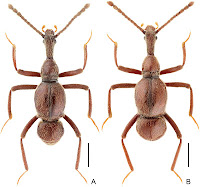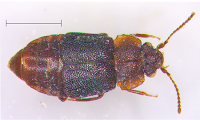Aleocharine Rove Beetles are small Rove Beetles, Staphylinidae, found in terrestrial environments across the globe. Like other Rove Beetles they have greatly shortened elytra (the win cases of Beetles, formed from hardened and modified forewings that usually protect and cover the hindwings and abdomen) leaving much of the abdomen exposed. The largest Aleocharines are about 10 mm in length, but most are less than 5 mm and some as small as 1 mm. The majority of species are soil-dwelling predators, but many are Myrmecophiles, living in the nests of Ants.
In a paper published in the journal ZooKeys on 23 November 2015, Zhu-Qi Yan and Li-Zhen Li of the Department of Biology at Shanghai Normal University describe a new species of Aleocharine Rove Beetle from nests of the Ant in the West Tianmushan Natural Reserve in Zhejiang Province, China.
The new species is placed in the Myrmecophilous genus Pella and given the specific name tianmuensis, meaning 'from Tianmu' (Tianmushan means 'Tianmu Mountain'). The species is described from 17 male and 27 female specimens. They are 4.56–6.60 mm in length and dark reddish brown and black in colour with yellow markings on the elytra.
Pella tianmuensis in dorsal view. Scale bar is 0.5 mm. Yan & Li (2015).
See also...
 Awas gigas: A new species of Rove Beetle from Guangxi Province, China. Rove Beetles, Staphylinidae, of the genus Awas
are tiny Beetles with elongate heads and constricted waists found
living in Ant's nests on the Malay Peninsula, in Taiwan and in
continental China. The group is poorly understood, with three of the
five described species being known only from a sngle specimen, and...
Awas gigas: A new species of Rove Beetle from Guangxi Province, China. Rove Beetles, Staphylinidae, of the genus Awas
are tiny Beetles with elongate heads and constricted waists found
living in Ant's nests on the Malay Peninsula, in Taiwan and in
continental China. The group is poorly understood, with three of the
five described species being known only from a sngle specimen, and... A new species of Rove Beetle from Jalisco State, Mexico. Rove Beetles of the genus Megarthrus are Fungus-feeding Beetles
distributed globally, but are most numerous and diverse in north-temperate
regions. In...
A new species of Rove Beetle from Jalisco State, Mexico. Rove Beetles of the genus Megarthrus are Fungus-feeding Beetles
distributed globally, but are most numerous and diverse in north-temperate
regions. In...
Rove Beetles (Staphylinidae) are an unusual-looking group of Beetles,
distinguished by their short wing cases, which makes them look rather
unbeetle-like. They are a successful group, with over 46 000...
Follow Sciency Thoughts on
Facebook.


